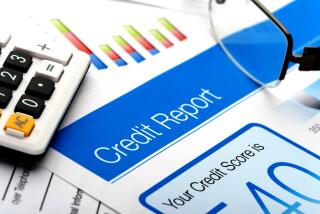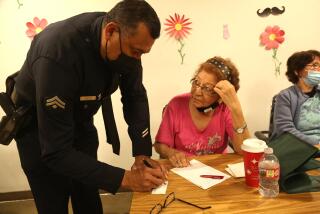Reused checking numbers give previous owners keys to your account
- Share via
When you lick a problem, you expect it to stay licked. Unfortunately, that’s not always the case.
In 2005, I wrote about the banking industry’s little-known practice of recycling checking account numbers. In other words, banks were reissuing former customers’ account numbers to new customers.
Trouble was, some of those former bank customers saved their old checks, using them later to pull money from the accounts of people who had received their recycled numbers.
California legislators stepped in and passed a law requiring that banks wait at least three years before reissuing account numbers.
A good move. But apparently not good enough.
Irvin and Harriette Williams are both in their 80s. The Culver City couple have been Bank of America customers for decades. Their son, Lorin, 49, now looks after their financial affairs.
Lorin Williams recently spotted an $800 check written on one of his parents’ bank accounts to a name he didn’t recognize.
“I asked my mom what this was for,” he told me. “She didn’t know.”
There was a good reason for that: She hadn’t written the check. Nor had her husband. Looking more closely, Williams saw that the check had been written by someone named Reuben Lopez. The check bore a North Hollywood address.
This prompted Williams to dig deeper into his parents’ checking account, where he discovered that Lopez had written about two dozen checks over the past couple of years. Most were for small amounts, which explained why they went unnoticed.
Williams contacted BofA. After looking into things, the bank’s fraud experts made a surprising discovery.
“They said my parents’ account number used to be this other guy’s number,” Williams said. “He closed his account 16 years ago, they said, and the number was later given to my parents. I never even knew they did this.”
They do. And it’s not just Bank of America.
Most major banks recycle customers’ checking account numbers. They say there aren’t enough new numbers to go around and it would be too expensive to add extra digits.
It’s a long shot, of course, that someone would close an account and then hold on to his or her old checks for years, awaiting the opportunity to write checks on someone else’s account. But it happens.
After I first wrote about the problem, then-Assemblywoman Carol Liu introduced a bill, which became law, requiring a three-year hold on old numbers before they could be recycled.
Williams said BofA’s initial response to his parents’ plight was to say it would cover bad checks written only in the previous 90 days. It also said that if Williams wanted copies of all of Lopez’s checks, which he did, he’d have to pay for them.
“That wasn’t acceptable,” he said.
Apparently someone at BofA eventually came to the same conclusion.
After some prodding on Williams’ part, the bank agreed to refund all the money Lopez had drained from the recycled account and cough up copies of the canceled checks. It also shut down the account so no more checks could be written.
“We apologize to Mr. Williams that this happened,” said Betty Riess, a BofA spokeswoman.
She declined to discuss details of the matter, but emphasized that such things don’t happen often. “The chances of a former account holder writing a check against a closed account after so many years are extremely rare,” Riess said.
To help minimize that risk, she said, BofA waits at least seven years before recycling account numbers — more than double the amount of time required by state law.
I tried to contact Lopez by calling the number printed on the checks he’d written. A woman who identified herself as his wife said she’d pass along my message. He never called back.
The problem of recycled account numbers hasn’t gone away. And it seems as if the answer isn’t just making banks wait a few years before putting an old number back in circulation. So what is?
The obvious solution is to create new numbers by adding another digit or two. Banks say this would cost millions of dollars in software upgrades to their systems.
To which I say: So what?
The U.S. banking industry posted its second-highest earnings on record last year, pocketing $141.3 billion, according to the Federal Deposit Insurance Corp. The only better year came in 2006 when banks earned $145.2 billion.
Do banks really think a few million bucks is too high a price to pay for safeguarding customers from fraud? I’ll bet they spend at least that much annually just reimbursing people for bogus checks.
Also, it couldn’t be that tough for banks’ computers to correlate checking account numbers with signers’ names. If, as was the case with the Williams, there’s a different name on the check, how difficult would it be for a computer to flag the transaction as potential fraud?
I put these questions to Riess. She said it’s BofA’s objective “to do everything possible to avoid this kind of situation.”
Clearly, though, the bank isn’t quite willing to do that.
State lawmakers rose to the occasion when the problem of recycled account numbers first came up. Time for them to do so again.
David Lazarus’ column runs Tuesdays and Fridays. He also can be seen daily on KTLA-TV Channel 5 and followed on Twitter @Davidlaz. Send your tips or feedback to [email protected].
More to Read
Inside the business of entertainment
The Wide Shot brings you news, analysis and insights on everything from streaming wars to production — and what it all means for the future.
You may occasionally receive promotional content from the Los Angeles Times.











